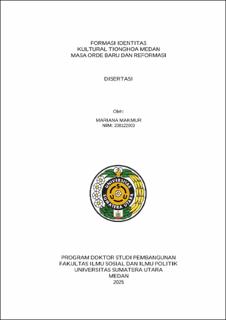Formasi Identitas Kultural Tionghoa Medan Masa Orde Baru dan Reformasi
The Formation of the Chinese Cultural Identitiy in Medan in the New Order and Reformation Period

Date
2025Author
Makmur, Mariana
Advisor(s)
Agustono, Budi
Lubis, Zulkifli
Kusmanto, Heri
Metadata
Show full item recordAbstract
This dissertation examines the formation (development) of the cultural identity of Medan’s Chinese community during the New Order and Reform Era. During the New Order era, the ruling regime implements various policies towards the Chinese community in Indonesia, playing a significant role in shaping their cultural identity. The New Order government enforces assimilation policies as a solution to the “Chinese problem,” introducing state policies aimed at dismantling the pillars of Chinese ethnic identity. These policies are outlined in Presidential Instruction No. 14/1967, dated December 6, 1967, and Cabinet Presidium Decree No. 127/U/Kep/12/1966. After the May 1998 riots and the fall of the New Order regime, the state’s treatment of the Chinese community changed, marked by the emergence of various government policies recognizing the status of the Chinese people. The Reform Era allows freedom of expression in various aspects of ethnic and cultural identity that were previously prohibited. The research uses qualitative and ethnographic methods. Field data collection involves in-dept interviews with informants and observations of various cultural activities that express Chinese culture, as well as social activities that demonstrate concern for society. These cultural expressions show that Chinese-Indonesian culture is an inseparable part of the broader cultural diversity that enriches Indonesia’s multi-ethnic society. Field findings show that the cultural identity of Medan’s Chinese community strengthens in several aspects during the Reform Era. Using the psychocultural perspective proposed by de Vos and Romanucci-Ross (2006), the research identifies how ethnic identity affects individual behavior within society, particularly through subject feelings associated with group belonging. Such subjective loyalty cannot be measured solely by cultural criteria or visible historical facts. Through psychocultural analysis, the research finds that Medan’s Chinese community preserves and maintains their primordial identity. They experience “identity emotions”, cultural and ethnic, that drive efforts to safeguard and sustain their cultural and ethnic identity. This identity persists despite political pressures, demonstrating its resilience. This finding constitutes the “novelty” of this research.
